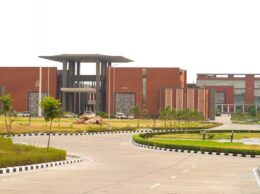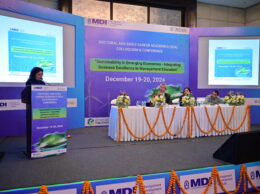CHENNAI : Indian Institute of Technology Madras has partnered with Tata Consultancy Services (TCS) to launch a web-enabled, user-oriented programme on “Industrial AI” that is targeted at upskilling employees in corporates in the applications of AI to industrial problems.
The 18-month-long course, designed in consultation with TCS, will be offered by IIT M in a completely online live teaching mode through virtual classrooms. The first cohort of students for the program will be from TCS.
Highlighting the strengths of this Program, Prof. V. Kamakoti, Director, IIT Madras, said, “This program, designed in consultation with TCS, will have strong theoretical courses and labs covering important topics in data science and AI. Theoretical courses will cover concepts in fundamental mathematical techniques required for understanding data science algorithms, time series analysis, multivariate Data Analysis, machine learning, deep learning and reinforcement learning.”
Further, Prof. Kamakoti said, “Applied courses will describe implementations of AI solutions for industrial problems in a case study format. Put together, these courses are expected to provide a strong theoretical foundation and significant application perspective to the participants in the course.”
Describing the unique aspects of this Program, Course Coordinator Prof. Raghunathan Rengasamy, Dean (Global Engagement), IIT Madras, said, “AI is going to impact every aspect of human experience in the years to come. This course will provide a unique perspective on the impact of AI in industrial systems. Leveraging AI techniques in industries can lead to processes that are robust, inherently safer and ultimately lead to environmentally benign processes. These are some of the key aspects that will be deliberated in this course.”
Speaking about this new course, Prof. Prathap Haridoss, Dean (Academic Courses), IIT Madras, said, “There is a strong need for well-trained human resources in the area of AI. This program aims to meet this need in a manner that directly addresses Industry requirements.”
The key outcomes/benefits envisaged from the M.Tech in Industrial AI Include:
Ø Upskilling of Indian workforce in this important area
Ø Improving the knowledge ecosystem that is critical for AI adoption
Ø Translation of AI theory to practice
Ø Industrial solutions that are sustainable
Ø Development of AI theory and pedagogical methods for AI training informed by an application perspective
Speaking about this collaboration, Mr. K Ananth Krishnan, Executive Vice President and Chief Technology Officer, TCS, said, “TCS Research partners with premier academic institutes to explore emerging technologies with scientific rigor as they gain mainstream adoption. We are happy to collaborate with IIT-Madras, a member of the TCS Academic Co-Innovation Network, to create a new M Tech program in Industrial AI for working professionals so that they gain a deeper understanding of data science and AI which they can apply to drive innovation in industry.”
Describing the impact of this collaboration, Mr. Regu Ayyaswamy, Senior Vice President and Global Head – IoT & Digital Engineering, TCS, said, “Industrial analytics is a combination of Data Science and Physics. It is becoming vital for manufacturers who are transforming with Digital Twins to Neural Manufacturing that will maximize efficiency, improve flexibility and predict the outcomes. This will eventually lead to adoption of autonomous manufacturing. The best of IIT M and TCS together will shape this course that will accelerate the adoption of industrial analytics at scale.”
The IT revolution has positioned India as a significant global player. The current knowledge revolution that is backed by AI requires deep skills and understanding of this fascinating area. The development and adoption of this field is moving at such a frenetic pace that agile training and upskilling of Indian workforce is an imperative. Courses such as this will satisfy this need.
Each Subject will have one Mid-term and a final examination conducted in online mode, besides a Project Work. There will be a total of 28-30 Hours of online classes per week. with Post-classroom activities, such as Assignments, Reading, and Preparation, likely to take up 20-22 Hours per week.









